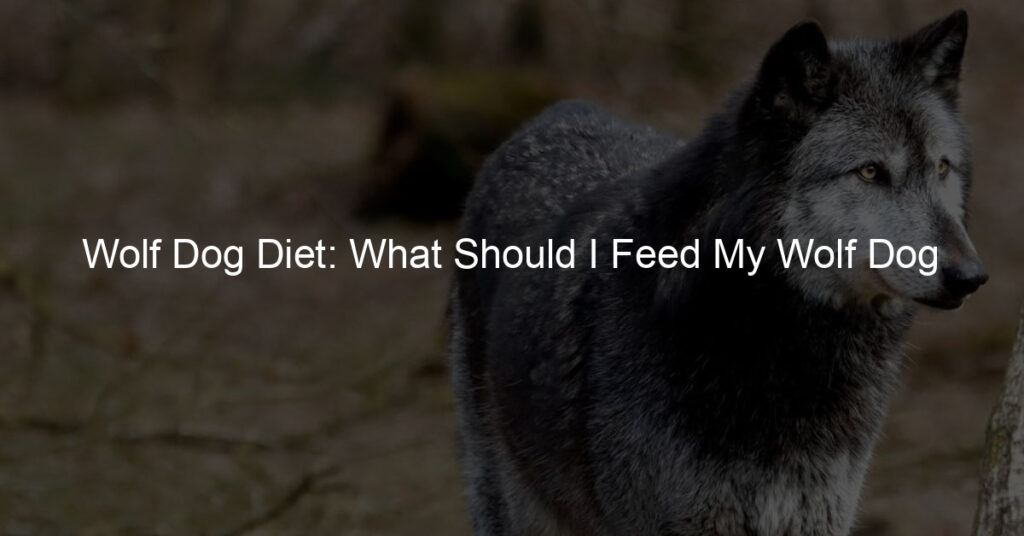If you’re one of the lucky few who have a wolf dog, you may be wondering what the best diet is for your furry friend. While there are many opinions on the matter, we’ve compiled some tips to help you make sure your wolf dog is getting everything they need to stay healthy and happy. Keep reading to learn more!
What should I feed my wolf dog?
Feeding a wolf dog may take a bit of extra thought, as these misunderstood animals’ dietary needs, while varied, can be complex and specific.
Wolves in the wild eat a diet rich in proteins and fats, consuming everything from ungulates to rodents depending on availability. Unfortunately, typical pet store food doesn’t necessarily offer the right balance for these unique dogs.
Researching what your wolf dog needs nutritionally is essential, coupled with providing a mix of high-quality kibble and raw foods like beef or chicken.
Adding additional components such as freeze-dried liver or krill oil improves daily nutrition. But most importantly, make sure it’s something your wolf will enjoy- that tail wag is the best reward for any hardworking owner!
Can I feed my wolf-dog food?
If you own a wolf, it might seem logical to think that feeding it dog food is a good idea – after all, wolves and dogs are closely related.
While it can be okay to feed your wolf the occasional meal of kibble, it’s important to remember that wolves and dogs have different nutritional needs.
Wolves need diets that contain higher amounts of fat and protein than what most commercial dog foods provide. A better choice would be a diet specifically formulated for wolves, or one recommended by your local veterinarian.
Feeding your wolf kibble every once in a while is also fine, but make sure you’re supplementing your regular diet with plenty of nutritious, natural sources of prey found in the wild – like meat, fish, fruits, and vegetables!
What is the best dog food for wolf hybrids?
Wolf hybrids can be a very unique pets to own, but that doesn’t mean their dietary needs are any different from other dogs. When it comes to choosing the best food for your wolf-hybrid pup, you’ll want to pick one that focuses on their nutrition.
Look for dog food packed with proteins such as lean chicken, turkey, and fish that will provide your furry friend with plenty of energy. You also don’t want to forget about vitamins and minerals like zinc and Omega 3 fatty acids for increased growth and development.
With so many varieties on the market these days, you can find something tailored specifically for wolf hybrids so you know they’re getting exactly what they need.
What is the best food for wolves?
Wolves have hearty appetites, which is why it’s important to make sure they are getting the best nutrition. The diet of wolves includes a variety of wild meats, such as deer, elk, and moose; small mammals like beavers and rabbits; birds, eggs, and carrion (already dead animals); and fish.
Depending on the season and availability of certain foods in their environment, wolves may also forage for plant material that often contains nutrients otherwise unavailable from traditional meat sources.
In areas where there is human influence, wolves can find food left out by humans such as apples or pet food. While all these provide adequate nutrition for a wolf, the wild game remains the optimal source of sustenance for these amazing animals.
Do wolves need to eat every day?
When it comes to wolves, it’s widely accepted that they need to eat every day just like any other animal. However, just like any other wild creature, a wolf’s diet can vary greatly depending on how many food sources are available and the type of prey they hunt to survive.
Wolves can easily go multiple days without eating if there isn’t an abundance of prey in their area – but this doesn’t mean they’re not constantly on the lookout for potential meals.
Over the years their hunting strategies have proven to be remarkably efficient so that when the time does come for them to feast, they can do so with relative ease.
What do wolf puppies eat?
One of the most interesting things about wolves is their eating habits. While they are carnivorous, wolf puppies primarily feed on their mother’s milk, similar to a human baby.
This milk provides the necessary nutrients for them to grow and develop. Once they are around two weeks old, wolf pups begin to eat food more solid in consistency. This usually consists of meat from small animals like voles and hares that their parents hunt down for them.
Additionally, as they begin to explore further from the den, pups will also seek out small fruits and vegetables like berries so that they can supplement their meat-eating diet with something more plant-based.
Conclusion
Overall, proper nutrition is essential for wolf dogs and can be achieved through a combination of commercially available dry foods, homemade diets, and raw diets specifically tailored to their needs. When choosing what to feed your wolf dog it is important to keep in mind their unique dietary requirements.
An appropriate diet will help ensure that they remain healthy and happy. If you are unsure what is best for your wolf dog, it’s always best to consult with an experienced vet.
Having the right diet can make all the difference in promoting a longer life span and good health. Taking some time upfront to understand your wolf dogs nutritional requirements will lead to many enjoyable years of companionship with them!








